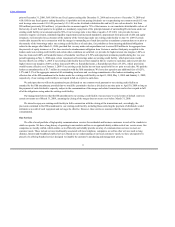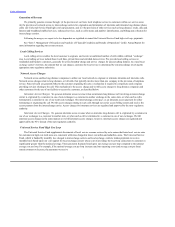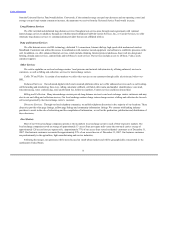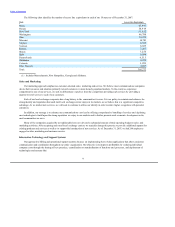FairPoint Communications 2007 Annual Report Download - page 18
Download and view the complete annual report
Please find page 18 of the 2007 FairPoint Communications annual report below. You can navigate through the pages in the report by either clicking on the pages listed below, or by using the keyword search tool below to find specific information within the annual report.
Table of Contents
The FCC has required that independent incumbent local exchange carriers that provide interstate long-distance services originating
from their local exchange service territories must do so in accordance with “non-structural separation” rules. These rules have required
that our long-distance affiliates (i) maintain separate books of account, (ii) not own transmission or switching facilities jointly with the
local exchange affiliate, and (iii) acquire any services from their affiliated local exchange telephone company at tariffed rates, terms and
conditions. The Bell Operating Companies have been subject to additional requirements to separate their long-distance operations form
their local exchange operations in the regions where they operate as Bell Operating Companies. In addition, the Northern New England
business’ local exchange carriers have been obligated under the FCC’s “equal access” scripting requirement to read new customers a list
of all available long-distance carriers presented in random order. Not all of our competitors must comply with these requirements.
Therefore, these requirements may put us at a competitive disadvantage in the interstate long-distance market. The FCC recently ruled
that the Bell Operating Companies need no longer comply with these rules for their long-distance services in order to avoid classification
as a dominant carrier, and that their independent/incumbent local exchange carrier affiliates need no longer comply with the separation
rules for their long distance services, provided that they comply with certain existing and additional safeguards, such as providing
special access performance metrics, offering low-volume calling plans, and making available certain monthly usage information on
customers’ bills. The FCC also has ruled that the Bell Operating Companies and their independent incumbent local exchange carrier
affiliates are no longer required to comply with the equal access scripting requirement. In approving the transfer of authorizations, the
FCC stated that following the transactions, we would be entitled to this same relief.
We are subject to a number of other statutory and regulatory obligations at the federal level. For example, the Communications
Assistance for Law Enforcement Act, or CALEA, requires telecommunications carriers to modify equipment, facilities and services to
allow for authorized electronic surveillance based on either industry or FCC standards. Under CALEA and other federal laws, we may be
required to provide law enforcement officials with call records, content or call identifying information, pursuant to an appropriate
warrant.
The FCC limits how carriers may use or disclose customer proprietary network information, referred to as CPNI, and specifies
what carriers must do to safeguard CPNI provided to third parties. The U.S. Congress has enacted, and state legislatures are considering,
legislation to criminalize the sale of call detail records and to further restrict the manner in which carriers make such information
available. The FCC has recently amended its rules to address these practices, and such rule changes could result in additional costs to
us, including administrative or operational burdens on our customer care, sales, marketing and information technology systems.
In addition, if we seek in the future to acquire companies that hold FCC authorizations, in most instances we will be required to
seek approval from the FCC prior to completing those acquisitions. The FCC has broad authority to condition, modify, cancel, terminate
or revoke operating authority for failure to comply with applicable federal laws or rules, regulations and policies of the FCC. Fines or
other penalties also may be imposed for such violations. The interstate common carrier services that we will provide will also be subject to
nondiscrimination requirements and requirements that rates be just and reasonable.
The FCC has adopted a series of orders that recognize the competitive nature of broadband and Internet-based services, and impose
lesser regulatory requirements on broadband services and facilities than apply to narrowband operations.
With respect to our local network facilities, the FCC has determined that certain unbundling requirements that apply to narrowband
facilities do not apply to broadband facilities such as fiber-to-the-premises loops and packet switches. The FCC recently has ruled that
broadband Internet access services offered by telephone companies (using DSL technology), cable operators, electric utilities and wireless
providers qualify as largely deregulated information services. Telephone companies or their affiliates may offer the underlying broadband
16
























